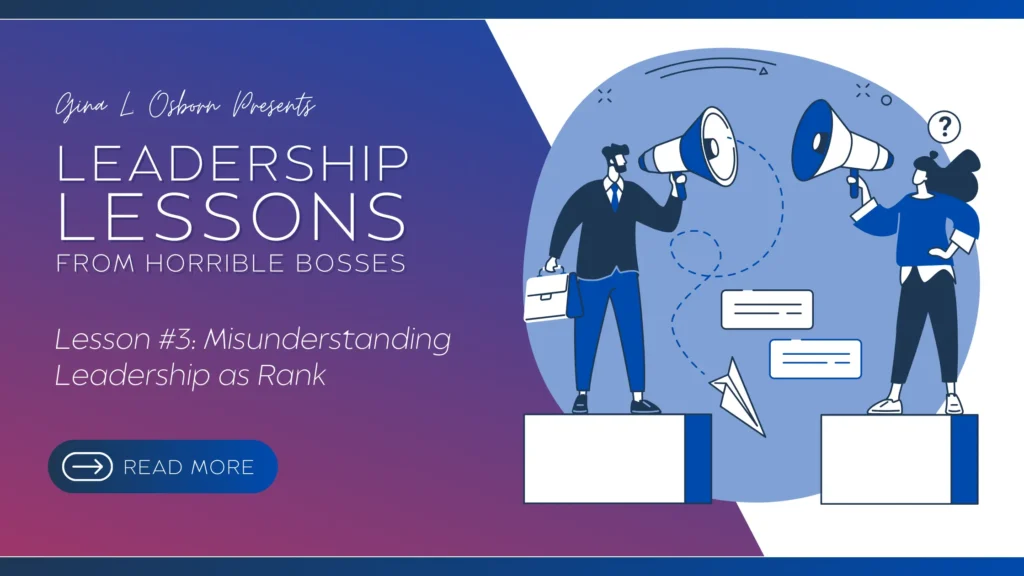A boss who believes leadership is purely about their position and rank often misses the mark when it comes to the true essence of leading a team. This type of leader frequently confuses authority with influence, wielding their title as a tool for command rather than a platform for inspiration.
The reality is that true leadership is about serving the team, guiding with vision, and empowering employees. When a boss views leadership solely as a position of power, it negatively impacts not just the team but the entire organization. Let’s dive into why this happens, and what we as leaders can do about it.
Behaviors That Reflect This Mindset
A boss who sees leadership as an entitlement based on rank typically exhibits certain behaviors that reveal a fundamental misunderstanding of what leadership should be:
- Demanding Respect Rather Than Earning It: These leaders expect respect automatically because of their title, without taking the time to build genuine rapport. They issue orders and expect unquestioned obedience rather than engaging in meaningful dialogue with their team members. This approach creates a culture of compliance rather than commitment, where employees do the bare minimum because they feel obligated, not inspired.
- Micromanaging to Assert Control: To maintain their perceived authority, these bosses often micromanage tasks, constantly overseeing the work of others and dictating how things should be done. This not only stifles creativity but also sends a message that the leader doesn’t trust the team to make good decisions. Over time, it erodes morale and discourages employees from taking initiative, as they come to believe their ideas will be dismissed.
- Using Their Title as a Shield: When problems arise, this type of leader may hide behind their position, using their rank to deflect criticism or avoid accountability. Instead of addressing issues head-on and learning from mistakes, they leverage their authority to shift blame. This behavior fosters resentment and diminishes trust within the team, as employees begin to see their leader as someone who is more concerned with saving face than doing what’s right.
- Avoiding “Menial” Tasks: They often believe that certain tasks are beneath them, delegating even the smallest jobs to others while never pitching in. This reinforces the notion that leadership is about giving orders, not rolling up one’s sleeves and working alongside the team. When a leader considers themselves too important to help out with day-to-day duties, they create a divide between themselves and their staff, signaling that they see themselves as above the rest.
The Negative Impact on the Workforce
When a leader confuses authority with influence, the repercussions are far-reaching. The workforce quickly becomes demoralized, as employees feel undervalued and disconnected from the mission. The team may lose faith in leadership, resulting in high turnover, reduced productivity, and a lack of innovation. Furthermore, the “us versus them” mentality often takes root, creating silos and stifling collaboration.
A culture where leadership is synonymous with rank encourages people to seek promotions for the wrong reasons. Instead of aspiring to lead because they want to make a difference, employees may see climbing the ladder as a means to gain power. This mindset perpetuates the cycle of poor leadership, as those who view positions of authority as an opportunity to wield control rather than to serve and inspire are promoted.
True Leadership in Action
I had the privilege of learning what real leadership looks like from Ethel McGuire, a boss I worked with during my time in the FBI. Ethel led an intensive counterterrorism operation, and despite being in charge, I found her taking out the trash that had piled up in the command post over the weekend. She didn’t view herself as too important to roll up her sleeves and pitch in. Instead, she saw a need, stepped up, and handled it. Her actions spoke volumes—she was not above doing any task necessary for the good of the team.
This experience taught me a valuable lesson: never ask one of your employees to do something you wouldn’t be willing to do yourself. Ethel’s willingness to take on even the smallest tasks exemplified true leadership, which is about serving others, not being served. It’s a lesson I’ve carried forward in my career. At celebrations, I always volunteer to cut the cake—it’s not just a gesture; it’s an honor for me to serve my people.
Leadership Is About Earning Trust, Not Demanding It
True leadership is not a right granted by a position; it’s an earned relationship built on trust, respect, and the ability to inspire others. It requires a commitment to serve the team, guide them with a vision, and empower them to reach their potential. When a leader views their role as an opportunity to support others, they foster a culture where employees feel valued and motivated.
Leaders should aspire to earn respect through their actions rather than demand it because of their title. They should guide by example, demonstrating that no task is too small, and that the needs of the team always come before the perks of the position. By being approachable and accountable, leaders can cultivate an environment of mutual trust and respect, where employees are not only willing to follow but are inspired to excel.
Lessons for New Leaders
For those new to leadership roles, remember that your position is not a badge of superiority but a responsibility to guide and empower others. The authority that comes with rank is temporary, but the influence you build through authentic leadership lasts far longer. Embrace humility, be willing to take on the less glamorous tasks, and always prioritize the well-being of your team. When you serve your people, they will go above and beyond to help you—and the organization—succeed.
Leadership is not about power or titles; it’s about making a difference. It’s about lifting others up, guiding them to new heights, and setting an example that inspires them to do the same. In the end, the true measure of a leader is not in the authority they wield but in the lives they touch and the people they empower.
About Gina L. Osborn
Gina L. Osborn is a former FBI Assistant Special Agent in Charge, former Chief of Safety for LA Metro, and recognized expert in security, crisis management, and leadership. With extensive experience combating international terrorism, cybercrime, and violent crime, she is committed to helping organizations develop effective, proactive safety strategies and shares lessons on authentic leadership, leading through chaos, crisis, and change, and rising to the top in male-dominated fields. To learn more, visit www.ginalosborn.com.

